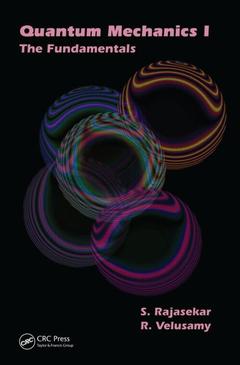Quantum Mechanics I The Fundamentals
Auteurs : Rajasekar S., Velusamy R.

Quantum Mechanics I: The Fundamentals provides a graduate-level account of the behavior of matter and energy at the molecular, atomic, nuclear, and sub-nuclear levels. It covers basic concepts, mathematical formalism, and applications to physically important systems.
The text addresses many topics not typically found in books at this level, including:
- Bound state solutions of quantum pendulum
- Pöschl?Teller potential
- Solutions of classical counterpart of quantum mechanical systems
- A criterion for bound state
- Scattering from a locally periodic potential and reflection-less potential
- Modified Heisenberg relation
- Wave packet revival and its dynamics
- Hydrogen atom in D-dimension
- Alternate perturbation theories
- An asymptotic method for slowly varying potentials
- Klein paradox, Einstein-Podolsky-Rosen (EPR) paradox, and Bell?s theorem
- Numerical methods for quantum systems
A collection of problems at the end of each chapter develops students? understanding of both basic concepts and the application of theory to various physically important systems. This book, along with the authors? follow-up Quantum Mechanics II: Advanced Topics, provides students with a broad, up-to-date introduction to quantum mechanics.
Print Versions of this book also include access to the ebook version.
Why Was Quantum Mechanics Developed? Schrödinger Equation and Wave Function. Operators, Eigenvalues, Eigenfunctions, and Wave Function. Exactly Solvable Systems I: Bound States. Exactly Solvable Systems II: Scattering States. Matrix Mechanics. Various Pictures in Quantum Mechanics and Density Matrix. Heisenberg Uncertainty Principle. Momentum Representation. Wave Packet. Theory of Angular Momentum. Hydrogen Atom. Approximation Methods I: Time-Independent Perturbation Theory. Approximation Methods II: Time-Dependent Perturbation Theory. Approximation Methods III: WKB and Asymptotic Methods. Approximation Methods IV: Variational Method. Scattering Theory. Identical Particles. Relativistic Quantum Theory. Mysteries in Quantum Mechanics. Numerical Methods for Quantum Mechanics. Appendices. Index.
S. Rajasekar received his B.Sc. and M.Sc. in physics both from the St. Joseph’s College, Tiruchirapalli. In 1987, he received his M.Phil. in physics from Bharathidasan University, Tiruchirapalli. He was awarded a Ph.D. in physics (nonlinear dynamics) from Bharathidasan University in 1992. In 2005, he became a professor at the School of Physics, Bharathidasan University. His recent research focuses on nonlinear dynamics with a special emphasis on nonlinear resonances. He has coauthored a book, and authored or coauthored more than 80 research papers in nonlinear dynamics.
R. Velusamy received his B.Sc. in physics from the Ayya Nadar Janaki Ammal College, Sivakasi in 1972 and M.Sc. in physics from the P.S.G. Arts and Science College, Coimbatore in 1974. He received an M.S. in electrical engineering at the Indian Institute of Technology, Chennai in the year 1981. In the same year, he joined in the Ayya Nadar Janaki Ammal College as an assistant professor in physics. He was awarded an M.Phil. in physics in 1988. He retired in 2010. His research topics are quantum confined systems and wave packet dynamics.
Date de parution : 12-2014
15.6x23.4 cm
Disponible chez l'éditeur (délai d'approvisionnement : 13 jours).
Prix indicatif 105,47 €
Ajouter au panierThèmes de Quantum Mechanics I :
Mots-clés :
Orbital Angular Momentum; mathematical framework of quantum mechanics; Partial Wave Expansion; time evolution of quantum mechanical systems; Spin; Modified Heisenberg relation; Spin Angular Momenta; Hydrogen atom in D-dimension; Wave Function; perturbation theories; Linear Harmonic Oscillator; Numerical methods for quantum systems; Time Dependent Perturbation Theory; Einstein-Podolsky-Rosen paradox; Hydrogen Atom; approximation methods; Momentum Wave Function; Schrödinger and time evolution; Quantum Mechanical Sy



